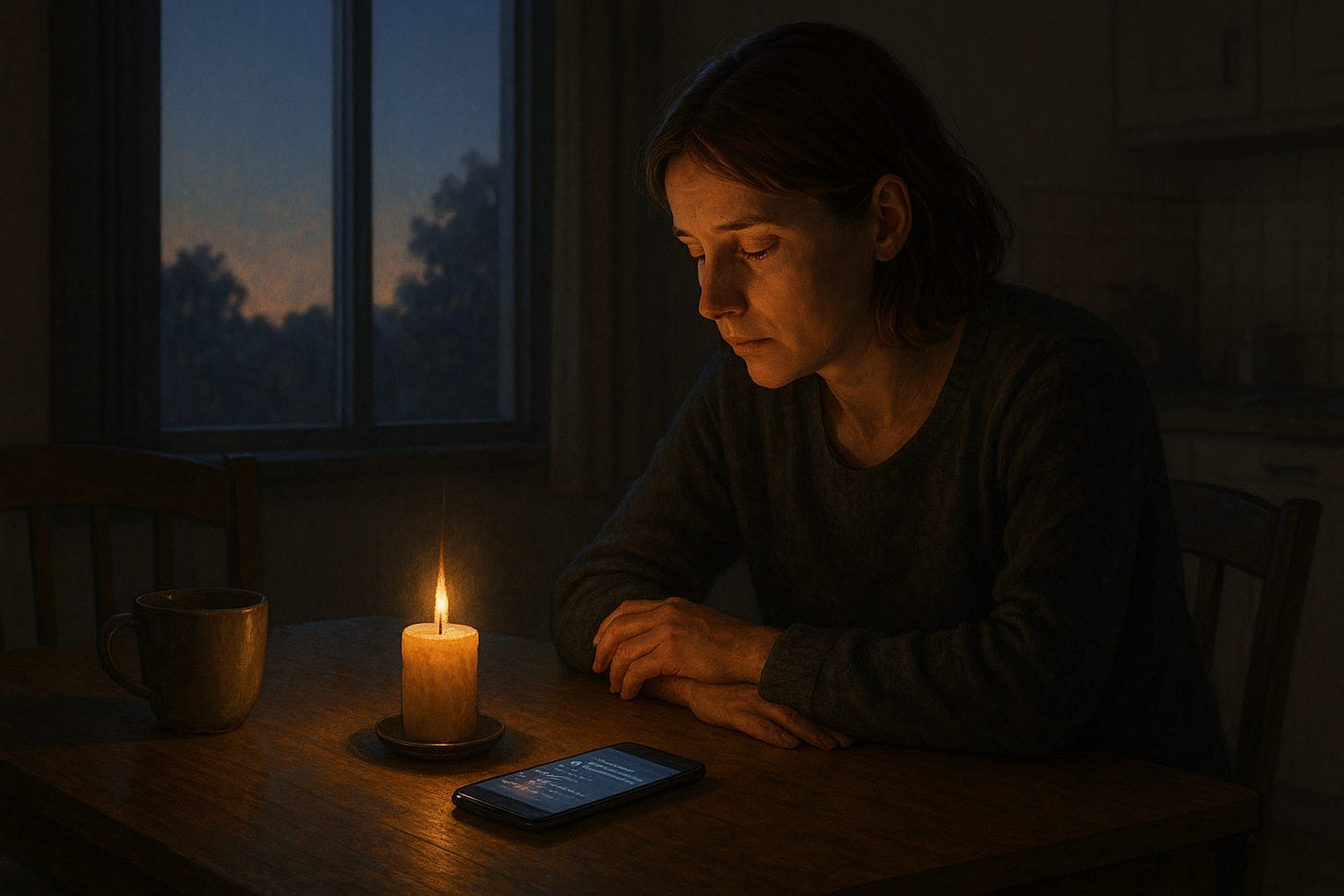Some losses unfold quietly.
No announcement.
No public reckoning.
Just the weight of what’s gone, landing inside one person.
You don’t always realize you’re carrying it at first.
Grief doesn’t arrive like a headline.
Sometimes it just settles in like a fog, hard to explain and even harder to share.
Earlier this week, I wrote about death hierarchies.
The way certain deaths get lifted into public ritual, while others vanish without mention.
That piece was about what we notice and what we ignore.
This one is about the ache that follows, the part that doesn’t get witnessed.
I remember the day my dad had a heart attack.
The exact moment my phone rang is a blur; it was 4am, and I was jolted awake by the call, but I remember how my body reacted.
That full-body stillness. That kind of knowing that starts in your chest before your brain catches up.
I sat in that quiet panic, trying to stay upright. Waiting to hear more.
Not thinking clearly. Not yet crying. Just bumbling for my clothes and calling my sisters to meet me at the hospital.
While I sat there waiting for some testing to be completed, my phone kept vibrating. I glanced down, expecting an update.
Instead: news alerts. Group chats. Social media notifications blowing up.
Kobe Bryant had died.
I started seeing his name everywhere, tributes, articles, photos of him with his daughter.
People were gutted. The internet wrapped itself in collective mourning. It was all I could hear the hospital staff talking about.
And I remember feeling completely detached.
Not because I didn’t care. I did. I admired him. His death was tragic.
But while everyone else was consumed by a loss they had never personally lived, I was quietly preparing for the possibility that I might lose my father, which I did a few days later.
Being in the middle of private grief while the world performs public grief around someone else, it alters you.
It makes it hard to know where your pain belongs.
There are people whose deaths reshape the world.
And there are people who are gone before anyone realizes they were here.
The second kind is harder to talk about.
There’s no collective language to hold it.
You carry it.
Sometimes you tell a friend.
Sometimes you stay quiet.
Either way, it changes how you feel about space.
You notice the emptiness, but no one else seems to.
And the noticing becomes its own kind of ache.
Some griefs happen without ceremony.
The body is gone. The name barely spoken.
People move forward. You’re still inside it.
That space between what you’re feeling and what the world is doing, it stretches until it starts to feel like maybe you’re the one who’s out of step.
There’s nothing wrong with private grief.
But it gets heavier when you start to wonder if it even counts.
If this resonates—if your grief ever felt ignored or misread—you’re not alone in that.
I write about death, grief, and the ways we live through what we lose.
Subscribe to be part of this unfolding conversation.
There are so many kinds of loss that don’t fit into the stories people know how to hold.
A miscarriage that happened before anyone knew you were pregnant.
A parent with dementia who disappeared long before the body did.
The loss of a friend you hadn’t spoken to in years but still loved in a way that mattered.
A sibling who estranged themselves, and then died.
It’s not just about who died.
It’s about the space you were or weren’t allowed to take up after.
Grief doesn’t follow rules, but most people expect it to.
You might still cry at the wrong times.
You might talk about them more than you think you’re supposed to.
You might try to keep it hidden, and still feel exposed.
There’s no proper script. Just this strange terrain you’re left to walk, unsure if anyone else is still with you.
You might find yourself avoiding conversations.
You might struggle to say their name out loud.
Or maybe you say it often, because it’s the only way you know to keep them near.
None of that means you’re grieving wrong.
It means you’re still carrying what mattered.
Even if no one else saw the moment it broke.
Some losses don’t get wrapped in flowers or Facebook posts.
They settle in the body. They show up in small ways.
You notice them in a quiet moment when the world has moved on.
If that’s where you are, still remembering someone who didn’t get remembered, still aching in a space that feels like it shouldn’t be this empty, you’re not wrong for that.
You didn’t miss your window to be devastated.
You’re allowed to keep mourning, even if the world never really started.
There’s a tenderness in remembering someone no one else brings up anymore.
You’re not obligated to forget.
And you don’t need anyone else to validate what they meant to you.
There’s no expiration date on love.
And no ranking system for pain.
Ritual: Light a candle for someone who was overlooked. Speak their name. Let the room hold it.
Love today,
Heather 🌸


